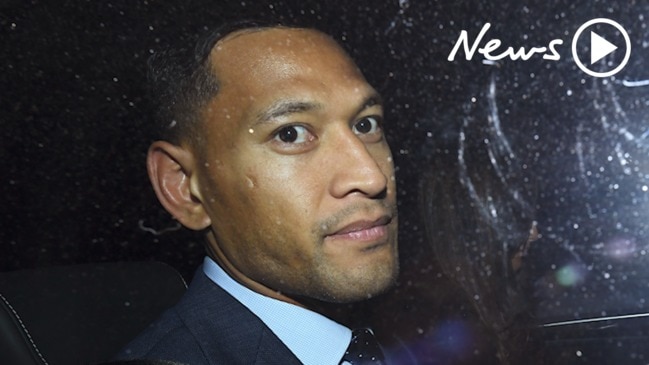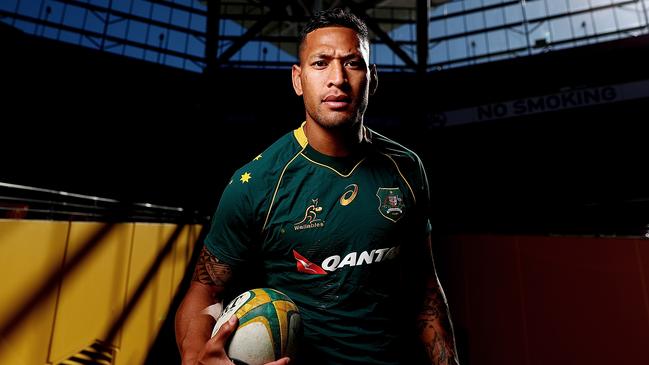Folau’s sacking isn’t a win for gay Australians
As a gay man and avid rugby fan, you’d think I’d be cheering to see Israel Folau lose his job. But actually, I’m terrified at what it signals for the rest of us with jobs and social media accounts, writes Simon Copland.

As a gay man, and a big rugby fan, I feel like I should be celebrating the decision from rugby Australia to tear up the contract of Israel Folau.
His comments are certainly hurtful, and it is a form of homophobic attitude that often keeps a lot of people out of sport. While an advocate for free speech I also recognise that speech acts sometimes come with consequences. It’s easy to see this decision as just one of those consequences.
MORE FROM RENDEZVIEW: Whose freedom of speech is more important?
However, I’m not celebrating. In fact I feel extraordinarily uncomfortable with this outcome.
For me, the Israel Folau case represents an insidious trend of the increasing incursion of corporate life into our everyday lives. And this should worry us all.

Businesses are increasingly expecting workers to represent them not just while at work, but outside of it too. Employees are becoming representatives of their bosses in every aspect of our lives. The big tech companies such as Google and Facebook are the best examples of this. They sell working there as a form of lifestyle — employees become part of the brand, and work becomes the driving force behind every part of their lives. Some have even described these spaces as ‘cult-like’.
MORE FROM RENDEZVIEW: By Izzy’s standards we’re all doomed
This incursion of the workforce into our life is no more prominent than in social media. It’s now common practice for companies to trawl social media accounts during recruitment processes in order to search for any form of material that may be embarrassing to the business. People frequently lose out on jobs because of old social media posts. Companies across the spectrum — from news agencies and IBM to Target and even small businesses — are introducing social media codes of conduct for their employees. These are a way to control what someone posts both while at work, but also out of office hours.

Corporations are increasingly seeing what happens outside of the work as fair game for something that can influence an employee’s career.
This approach is having real consequences. In Australia for example we’ve seen a number of high profile cases of people fired for social media posts. In 2018 Angela Williamson was sacked by Cricket Australia for posting criticisms of the Tasmanian Government’s approach to abortion. In 2015 the SBS Presenter Scott McIntyre faced a similar fate after posting ‘inappropriate’ comments about ANZAC Day.
MORE FROM RENDEZVIEW: Pull it together Israel Folau, for the love of God
For me, the Folau case is just another, although more high profile, example of this. As Rugby Australia has stressed to argue, Folau has not been undone due his views per se, but rather because of the breach of the code of conduct. This is not an issue of gay rights, but instead an issue of workplace relations.
This should make us all feel uncomfortable. It is a situation in which corporate powers now have increasing capacity to dictate what we say and do outside our work life.

The balance of work and life is now trending even further toward work, to a space where we’re not only working longer hours than ever, but where corporations can also begin to control our activities when we’re not even in the workplace.
MORE FROM RENDEZVIEW: Who cares what a footy player thinks?
Quite simply I don’t trust companies to make these decisions for us. Despite all their propaganda and talk of corporate responsibility, companies are not making these sorts of decisions with the interests of our community at heart. These decisions are made for two reasons only — to maintain public image and in turn to ensure ongoing profit margins. And while this may have swung in the direction of ‘gay rights’ in this instance, it can easily swing in the opposite direction at any other time as well. In fact, this is something the gay community has experienced recently when, in another high profile case, Telstra backed away from support on same-sex marriage due to backlash from the Catholic Church. We simply cannot trust corporations to get the interests of the gay community at heart.

Yes, Folau is a more high profile case than many others who have suffered this fate. He is also a celebrity, someone who has a lot of influence in the public. But at the same time he is an employee of Rugby Australia and this, in turn, is a matter of employee rights. He has been undone by a workplace code of conduct, one that drove his life both at work and outside of it. These codes are increasingly doing the same for all.
MORE FROM RENDEZVIEW: The real problem with our Israel Folau outrage
There were, I’m certain, other alternatives to sacking Folau. Rugby Australia could have actively distanced themselves from his views and worked even harder to make the sport an inclusive space. If they were so concerned about his views representing the sport they could, surely, have barred him from speaking publicly in the capacity as a representative of the code.
Instead his sacking sends a message that if you work for a corporation they get to dictate what you say on any public social media post. This should concern us all.
Simon Copland is a columnist for RendezView.com.au


